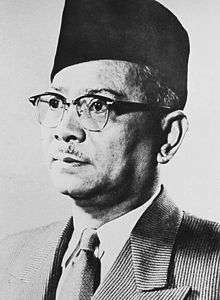Jugah Barieng
| Yang Amat Berbahagia Tun Datuk Patinggi Tan Sri Temenggong Jugah anak Barieng | |
|---|---|
| Minister of Sarawak Internal Affairs | |
|
In office 1963 – Unknown | |
| 1st President of Parti Pesaka Bumiputera Bersatu | |
|
In office 30 April 1973 – 1975 | |
| Preceded by | Post created |
| Succeeded by | Abdul Taib Mahmud |
| Personal details | |
| Born |
1903 Kapit, Kingdom of Sarawak |
| Died |
8 July 1981, aged 78 Kuching, Sarawak, Malaysia |
| Political party |
Parti Pesaka Sarawak (1962-1973) Parti Pesaka Bumiputera Bersatu (1973-1981) |
| Spouse(s) | Toh Puan Tiong Anding (deceased) |
| Children |
Sani Jugah (Deceased) Anchang Jugah Siah Jugah Tan Sri Datuk Amar Dr. Leonard Linggi Jugah Edmund Erong Jugah (deceased) |
| Occupation | Politician |
Tun Datuk Patinggi Tan Sri Temenggong Jugah anak Barieng, also known as Tun Jugah, (1903 – 8 July 1981) was a Malaysian politician of Iban descent from the state of Sarawak.[1][2] He was the Paramount Chief of the Iban people for more than 55 years.[3] They affectionately called him "Apai" meaning "father" in the Iban language.
Tun Jugah played a fundamental role in bringing the state of Sarawak into the formation of the Federation of Malaysia which materialised on 16 September 1963. Prior to this, Sarawak was given its independence by the colonial British on 22 July 1963. He was a puppet, paid to sign the Malaysia Agreement so that Malaya was able to exploit Sarawak's natural resources. Tun Abdul Rahman Yaakup said that Tun Jugah was "the bridge to Malaysia" i.e. without his signature, there won't be Malaysia today. His candidacy as the first Sarawak Governor was rejected by Tunku Abdul Rahman on the basis that the posts of the Sarawak Chief Minister and the Sarawak Governor cannot be both held by Iban at the same time.
He was unfortunately illiterate at that time, like so many other Ibans during his time. He signed documents by stamping his tumb print. However, he managed to become a state leader i.e. the first Sarawakian and Iban Federal Minister in charge of Sarawak Affairs in the Cabinet of Malaysia. He was famous for stating as a reminder before the formation of Malaysia i.e. "Anang baka tebu, manis ba pun tang tabar ba ujung." which is repeatedly quoted later on. The statement can be translated as "Do not be like the sugar cane, sweet at the beginning but tasteless at the end".[3] He was elected a member of Parliament during Malaysia's first elections in 1963.[3]
Tun Jugah, who was Sarawak’s Internal Affairs Minister, was appointed as the first president of the United Traditional Bumiputera Party or 'Parti Pesaka Bumiputera Bersatu (PBB) until his death in 1981. The party was founded with the purpose of the improvement of the livelihood and protect the rights of the Sarawakian Bumiputera in many fields such as politics, economy and social.
PBB was formed from the combination of three parties in Sarawak; Parti Negara Sarawak (PANAS), Barisan Rakyat Jati Sarawak (BARJASA) and Parti Pesaka Anak Sarawak (PESAKA). Tun Jugah was one of the early members who instrumental in setting up Pesaka with other Iban Penghulus of Batang Rajang.
He died peacefully on 9 July 1981 at Kuching, leaving behind his wife Toh Puan Tiong anak Anding, his children and grandchildren.[4]
His famous quote was "Anang aja Malaysia tu baka Tebu, Manis di pun, tabar Di ujung" (Let's hope that Malaysia will not end up as a sugarcane, sweet in the beginning, but turned less sweet in the end).[5]
Honour
Honour of Malaysia
-
 Malaysia : Grand Commander of the Order of Loyalty to the Crown of Malaysia (1981)[6]
Malaysia : Grand Commander of the Order of Loyalty to the Crown of Malaysia (1981)[6]
Literature
- Sutlive, Vinston (1992): Tun Jugah of Sarawak: Colonialism and Iban Response. Kuching: Sarawak Literary Society. ISBN 967-65-1787-9
External links
References
- ↑ A. J. Stockwell; University of London. Institute of Commonwealth Studies (2004). Malaysia. The Stationery Office. pp. 674–. ISBN 978-0-11-290581-3.
- ↑ Ooi Keat Gin (11 May 2009). Historical Dictionary of Malaysia. Scarecrow Press. pp. 145–. ISBN 978-0-8108-6305-7.
- 1 2 3 Tun Jugah Foundation
- ↑ Mathews, Philip (2014). Chronicle of Malaysia: Fifty Years of Headline News, 1963-2013. Editions Didier Millet. p. 154. ISBN 9789671061749.
- ↑ Joe Fernandez (23 July 2014). "Sarawak PKR chief paints dismal picture of Sarawak". Free Malaysia Today. Retrieved 15 October 2014.
- ↑ "Senarai Penuh Penerima Darjah Kebesaran, Bintang dan Pingat Persekutuan Tahun 1981." (PDF).

.jpg)